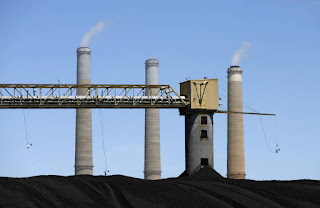The plan would have given a big subsidy to the coal industry. FERC, the Federal Energy Regulatory Commission, is instead asking power grid operators what's needed.
The Federal Energy Regulatory Commission on Monday unanimously rejected a Trump administration gambit that would have favored the coal industry by rewarding electric companies for keeping big stockpiles of fuel on hand, supposedly to improve the reliability of power supplies.
The commission, in one of its first significant actions since its membership was fleshed out with President Donald Trump's new appointees, said that it would do its own analysis of how the grid is coping and that it had solicited ideas from the nation's grid operators about how to proceed. The grid operators are the regional authorities who control power supplies, rather than the electric companies or their fuel suppliers.
The idea to bolster the coal and nuclear segments of the complex grid was pushed hard by Energy Secretary Rick Perry last year after extensive lobbying by influential fossil fuel companies, including Murray Coal and First Energy. The plan had been excoriated by diverse interest groups, including many environmental advocates, some public utility companies, and natural gas suppliers.
Consumers would have paid billions in higher bills, and most of the benefits would have gone to a few big companies, studies showed.
Neil Chatterjee, a Trump appointee who was the commission's interim chairman until early December, praised what he called "Secretary Perry's bold leadership in jump-starting a national conversation on this urgent challenge."
But another new commissioner, Richard Glick, called the proposal, which also would have affected some nuclear plants, "a multi-billion-dollar bailout" that was not supported by the evidence. He was named to FERC by Trump to a Democratic seat on the politically apportioned commission.
...
Uncompetitive Coal vs. Renewables and Gas
Glick was vehement in his criticism of Perry's plan.
"There is no evidence in the record," he wrote, "to suggest that temporarily delaying the retirement of uncompetitive coal and nuclear generators would meaningfully improve the resilience of the grid."
Indeed, he said, the Department of Energy's own staff study, performed at Perry's urging, had concluded that the retirement of coal-fired power plants in favor of cheaper, cleaner renewables and natural gas "have not diminished the grid's reliability or otherwise posed a significant and immediate threat to the resilience of the electric grid."
"To the contrary, the addition of a diverse array of generation resources, including natural gas, solar, wind, and geothermal, as well as maturing technologies, such as energy storage, distributed generation, and demand response, have in many respects contributed to the resilience of the bulk power system," he argued.
In a statement, Perry said that "a diverse fuel supply, especially with onsite fuel capability, plays an essential role in providing Americans with reliable, resilient, and affordable electricity, particularly in times of weather-related stress like we are seeing now."
But Glick dismissed that argument, noting that "many coal and nuclear plants with significant on-site fuel supplies have failed to function during extreme weather events because those fuel supplies froze, flooded, or were otherwise unavailable. In fact, initial reports indicate that coal-fired facilities accounted for nearly half of all forced outages in PJM during last week's period of extreme temperatures."
Read more at U.S. Regulators Reject Trump's 'Multi-Billion-Dollar Bailout' for Coal Plants

No comments:
Post a Comment